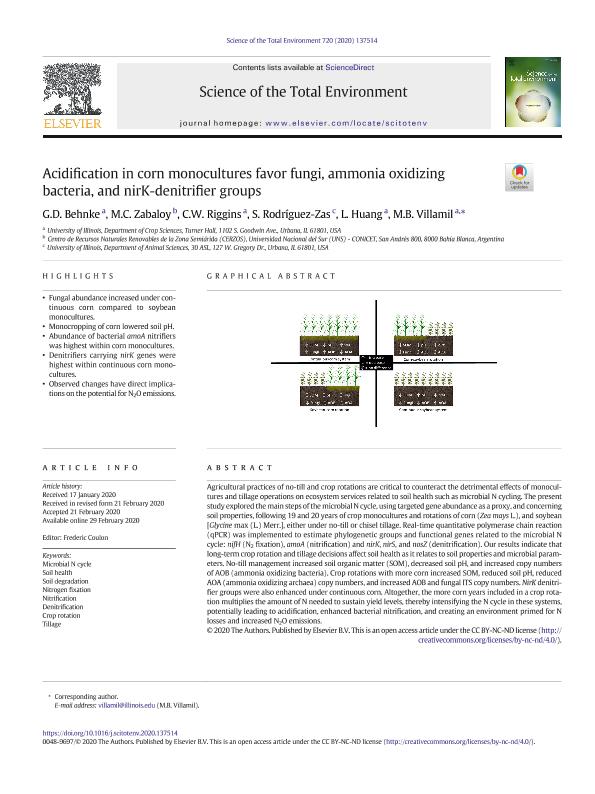Mostrar el registro sencillo del ítem
dc.contributor.author
Behnke, G. D.
dc.contributor.author
Zabaloy, Maria Celina

dc.contributor.author
Riggins, C. W.
dc.contributor.author
Rodríguez-Zas, S.
dc.contributor.author
Huang, L.
dc.contributor.author
Villamil, Maria Bonita

dc.date.available
2021-10-01T13:14:53Z
dc.date.issued
2020-06-10
dc.identifier.citation
Behnke, G. D.; Zabaloy, Maria Celina; Riggins, C. W.; Rodríguez-Zas, S.; Huang, L.; et al.; Acidification in corn monocultures favor fungi, ammonia oxidizing bacteria, and nirK-denitrifier groups; Elsevier; Science of the Total Environment; 720; 10-6-2020; 1-10; 137514
dc.identifier.issn
0048-9697
dc.identifier.uri
http://hdl.handle.net/11336/142220
dc.description.abstract
Agricultural practices of no-till and crop rotations are critical to counteract the detrimental effects of monocultures and tillage operations on ecosystem services related to soil health such as microbial N cycling. The present study explored the main steps of the microbial N cycle, using targeted gene abundance as a proxy, and concerning soil properties, following 19 and 20 years of crop monocultures and rotations of corn (Zea mays L.), and soybean [Glycine max (L.) Merr.], either under no-till or chisel tillage. Real-time quantitative polymerase chain reaction (qPCR) was implemented to estimate phylogenetic groups and functional genes related to the microbial N cycle: nifH (N2 fixation), amoA (nitrification) and nirK, nirS, and nosZ (denitrification). Our results indicate that long-term crop rotation and tillage decisions affect soil health as it relates to soil properties and microbial parameters. No-till management increased soil organic matter (SOM), decreased soil pH, and increased copy numbers of AOB (ammonia oxidizing bacteria). Crop rotations with more corn increased SOM, reduced soil pH, reduced AOA (ammonia oxidizing archaea) copy numbers, and increased AOB and fungal ITS copy numbers. NirK denitrifier groups were also enhanced under continuous corn. Altogether, the more corn years included in a crop rotation multiplies the amount of N needed to sustain yield levels, thereby intensifying the N cycle in these systems, potentially leading to acidification, enhanced bacterial nitrification, and creating an environment primed for N losses and increased N2O emissions.
dc.format
application/pdf
dc.language.iso
eng
dc.publisher
Elsevier

dc.rights
info:eu-repo/semantics/openAccess
dc.rights.uri
https://creativecommons.org/licenses/by-nc-nd/2.5/ar/
dc.subject
CROP ROTATION
dc.subject
DENITRIFICATION
dc.subject
MICROBIAL N CYCLE
dc.subject
NITRIFICATION
dc.subject
NITROGEN FIXATION
dc.subject
SOIL DEGRADATION
dc.subject
SOIL HEALTH
dc.subject
TILLAGE
dc.subject.classification
Otras Ciencias de la Tierra y relacionadas con el Medio Ambiente

dc.subject.classification
Ciencias de la Tierra y relacionadas con el Medio Ambiente

dc.subject.classification
CIENCIAS NATURALES Y EXACTAS

dc.title
Acidification in corn monocultures favor fungi, ammonia oxidizing bacteria, and nirK-denitrifier groups
dc.type
info:eu-repo/semantics/article
dc.type
info:ar-repo/semantics/artículo
dc.type
info:eu-repo/semantics/publishedVersion
dc.date.updated
2021-09-06T15:03:30Z
dc.journal.volume
720
dc.journal.pagination
1-10; 137514
dc.journal.pais
Países Bajos

dc.journal.ciudad
Amsterdam
dc.description.fil
Fil: Behnke, G. D.. University of Illinois; Estados Unidos
dc.description.fil
Fil: Zabaloy, Maria Celina. Consejo Nacional de Investigaciones Científicas y Técnicas. Centro Científico Tecnológico Conicet - Bahía Blanca. Centro de Recursos Naturales Renovables de la Zona Semiárida. Universidad Nacional del Sur. Centro de Recursos Naturales Renovables de la Zona Semiárida; Argentina
dc.description.fil
Fil: Riggins, C. W.. University of Illinois; Estados Unidos
dc.description.fil
Fil: Rodríguez-Zas, S.. University of Illinois; Estados Unidos
dc.description.fil
Fil: Huang, L.. University of Illinois; Estados Unidos
dc.description.fil
Fil: Villamil, Maria Bonita. University of Illinois; Estados Unidos. Consejo Nacional de Investigaciones Científicas y Técnicas; Argentina
dc.journal.title
Science of the Total Environment

dc.relation.alternativeid
info:eu-repo/semantics/altIdentifier/url/https://www.sciencedirect.com/science/article/pii/S0048969720310251
dc.relation.alternativeid
info:eu-repo/semantics/altIdentifier/doi/http://dx.doi.org/10.1016/j.scitotenv.2020.137514
Archivos asociados
